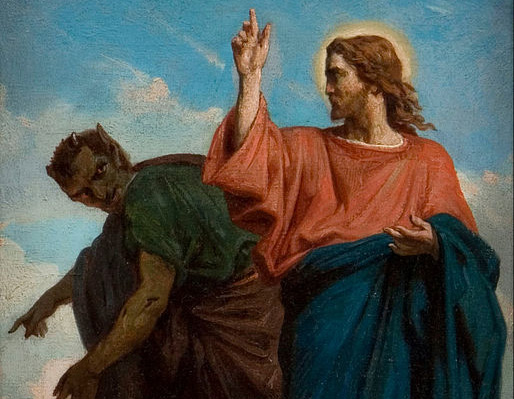I refer not only to the musical - which was released as a movie today by Disney Plus - but also to a book Kevin Cloud, who is a pastor, church planter, and author. He earned an M.Div. from Nazarene Theological Seminary. He has planted four successful churches in the Kansas City area and currently serves as the director of spiritual life at the Culture House, an arts conservatory in Olathe, Kansas. His site is www.godandhamilton.com.
With his permission, I am publishing his article as an intro to his book.
________________________________
Redemption
The musical Hamilton resonates with me more than any piece of art I
have ever experienced, primarily because it teems with the most important
themes of my life. Engaging these themes of grace, shame, forgiveness, and
surrender through Hamilton’s story encourages, inspires, and transforms me. But
above all other themes, Hamilton’s story resonates with me because, ultimately,
it tells a story that I desperately need to experience–a story of redemption.
When I take an honest assessment of my life, I see brokenness everywhere. I
live with mixed motives, impure thoughts, and selfish actions. When I look at
the world around me, more so today than ever, it appears to be constantly
assaulted by the forces of brokenness. Death, terrorism, poverty, and
divisiveness seem to win the day. My own life, and the world that we all live
in, both share an acute desperation for redemption.
Hamilton moves people because it reminds us of this possibility.
Interestingly, Hamilton is not the driving force behind this redemption, but
rather his loving, faithful, and determined wife, Eliza. She takes the
brokenness from his life and makes it beautiful.
The greatest source of pain and brokenness in Hamilton’s life originated
from his status as an orphan,
I read an article written by an orphan named David, who experienced a deep sense of abandonment and rejection, feelings he struggled with into his late fifties. Another girl whose parents died wrote that orphans grow up rarely feeling special or loved. They wear secondhand clothes, play with used toys, and rarely celebrate their birthdays. Many orphans don’t even know the date of their birthday.
I can imagine heartbreaking conversations where Hamilton shared his pain and suffering from being an orphan with Eliza. I can also imagine Eliza, as any loving spouse would, feeling a deep sense of empathy about Hamilton’s struggles as an orphan. Hamilton’s brokenness must have become her brokenness, as she carried his burden with her husband. After Hamilton’s death, and after she healed from her grief, Eliza took that hurt, suffering, and brokenness, and gave everything she could to redeem it, to make it new.
After Alexander died, grief overwhelmed Eliza. In his biography of Alexander Hamilton, Ron Chernow writes, “For Eliza Hamilton, the collapse of her world was total, overwhelming, and remorseless. Within three years, she had had to cope with four close deaths: her eldest son, her sister Peggy, her mother, and her husband, not to mention the mental breakdown of her eldest daughter.” Chernow shares that immediately after the death of Hamilton, Eliza invited Gouverneur Morris, a close family friend, into the room, then “burst into tears, told him he was the best friend her husband had, begged him to join her in prayers for her own death, and then to be a father for her children.”
Eliza, in this moment, found herself completely overwhelmed by brokenness and death. She couldn’t even begin to imagine redemption. But in time, God would give her faith to see the possibility of redemption out of the brokenness. Eventually, she would take Hamilton’s broken pieces and make them beautiful.
Eliza slowly recovered from her grief, finding solace in her faith in God. “Suffering from the ‘irreparable loss of a most amiable and affectionate husband,’ she prayed for ‘the mercies of the divine being in whose dispensations’ all Christians should acquiesce,” writes Chernow. Her faith helped her to recover from the devastating loss and begin to imagine a new life.
Hamilton himself had encouraged her to remember her faith before his death. In his letter he wrote the night before his duel with Aaron Burr, he reminded Eliza, “The consolations of religion, my beloved, can alone support you and these you have a right to enjoy. Fly to the bosom of your God and be comforted. With my last idea, I shall cherish the sweet hope of meeting you in a better world.”
As Eliza slowly recovered from her grief, she discovered a new calling. She partnered with a small group of women to found the first private orphanage in New York City. Her Hamilton had suffered as an orphan his entire life; now she would work to alleviate the suffering of others who faced the same struggle.
Orphans during this era faced a brutal reality, with no good options available to them. Many orphans lived on the streets in gangs, fighting a daily battle to survive. The tenement housing district was grossly overpopulated and overrun with abhorrent living conditions. Almshouses or indentured servitude provided shelter and food for a life of hard labor and a loss of freedom, but oftentimes created structures that abused vulnerable children.
For twenty-seven years, Eliza worked tirelessly, providing orphans a hopeful alternative. Chernow writes, “She oversaw every aspect of the orphanage work. She raised money, leased properties, visited almshouses, investigated complaints, and solicited donations of coal, shoes, and Bibles.” Eliza believed that God himself had given her this calling, “My maker has pointed out this duty to me and has given me the ability and inclination to perform it.”
The work challenged her greatly and oftentimes operated dangerously low on resources. Eliza once committed to never turning away a child, whether they possessed a dime in the treasury or not. In 1813, the orphanage account fell to $60 while caring for the needs of ninety children. Yet despite these ongoing challenges, Eliza believed in God’s provision and faithfully continued her work. In doing so, she offered redemption to these children who otherwise faced a hopeless existence.
The end of Miranda’s musical beautifully illustrates Eliza redeeming Hamilton’s brokenness. The scene captures one of the most powerful artistic representations of redemption I’ve ever witnessed. The final song features Eliza singing about the different ways she honored her husband’s legacy. She considered the orphanage her crowning achievement in this pursuit. She sings about how she helped hundreds of orphans in the city, and how she sees her husband in each child that she serves. The musical ends with a brilliant white spotlight shining on Eliza as she smiles, her face radiating joy as the theatre fades to black.
The way we become agents of redemption here and now is simple but hard: we love. Eliza made Hamilton’s brokenness beautiful for hundreds of orphans by loving them in tangible ways. She threw herself into this work out of her love for her husband, and her love of God. Chernow writes, “Perhaps nothing expressed her affection for Hamilton more tenderly than her efforts on behalf of orphans. . . . Surely some extra dimension of religious fervor had entered into Eliza’s feelings toward her husband because of his boyhood.”
The work she pioneered continues to this day. The organization Eliza created more than two hundred years ago still exists, now called Graham Windham. The people of Graham Windham continue to live out Eliza’s legacy, tirelessly working on behalf of poor children and families in New York City. The families they serve live in New York City’s most severely distressed neighborhoods, ninety-five percent of whom live at or below the poverty line.
Jess Dannhauser, the current president and CEO of Graham Windham, sees their work as a continuation of Eliza’s legacy. Experiencing the musical Hamilton moved him deeply. “When Eliza sings that she sees Alexander in the eyes of these orphans, I see that as her saying these kids have great potential inside of them. That spirit is what animates our work today.”
Kimberly Hardy Watson, Graham Windham’s chief operating officer, agrees: “I find myself often wondering, what would Eliza think about what we are doing today? If she and the other cofounders had a clear understanding of what they endeavored for children, are we keeping to that promise? Are we being good stewards of that vision?” More than two hundred years after Eliza initiated this project, the brokenness continues to be made beautiful.
The cast of Hamilton participates in the work of Graham Windham. Some of the cast members participate as pen pals with children from Graham Windham. Phillipa Soo and Morgan Marcell created “The Eliza Project,” with a mission to “use the arts as a means of expression, as an outlet for personal experience, and to uplift the creative spirit.” Soo recruits other cast members to join her in teaching kids at Graham Windham acting, dance, and rap. These actors continue to tell Eliza’s story of redemption, not only on the stage, but also in their tangible acts of love for these children.
Adapted from God and Hamilton. Copyright © 2018 by Kevin Cloud. Published by Deep River Books, Sisters, Oregon. Used by Permission.




















